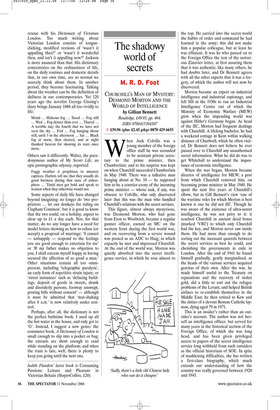The shadowy world of secrets
M. R. D. Foot
CHURCHILL’S MAN OF MYSTERY: DESMOND MORTON AND THE WORLD OF INTELLIGENCE by Gillian Bennett Routledge, £49.95, pp. 404, ISBN 9780415394307 ✆ £39.96 (plus £2.45 p&p) 0870 429 6655 When Jock Colville was a young member of the foreign office staff he was seconded to be assistant private secretary to the prime minister, then Chamberlain; and to his surprise was kept on when Churchill succeeded Chamberlain in May 1940. There was a talkative man hanging about at No. 10 — he supposed him to be a courtier-crony of the incoming prime minister — whose task, if any, was obscure to Colville, who only discovered later that this was the man who handled Churchill’s relations with the secret services.
This figure, almost always mysterious, was Desmond Morton, who had gone from Eton to Woolwich, became a regular gunner officer, earned an MC on the western front during the first world war, and on recovering from a severe wound was posted as an ADC to Haig; in which capacity he met and impressed Churchill. At the end of the world war, Morton was quietly absorbed into the secret intelligence service, in which he rose almost to the top. He carried into the secret world the habits of order and command he had learned in the army; this did not make him a popular colleague, but at least he was efficient. It was he who passed on to the Foreign Office the text of the notorious Zinoviev letter, at first assuring them that it was authentic; like many others, he had doubts later, and Dr Bennett agrees with all the other experts that it was a forgery, of which the author will not now be discovered.
Morton became an expert on industrial intelligence and industrial espionage, and left SIS in the 1930s to run an Industrial Intelligence Centre out of which the Ministry of Economic Warfare (MEW) grew when the impending world war against Hitler’s Germany began. As head of the IIC, Morton had frequent dealings with Churchill. A lifelong bachelor, he had a weekend cottage in Kent within walking distance of Chartwell, which he often visited; Dr Bennett does not believe he ever passed over to Churchill any unauthorised secret information. What he did do was to get Whitehall to understand the importance of economic intelligence.
When the war began, Morton became director of intelligence for MEW; a post from which Churchill removed him, on becoming prime minister in May 1940. He spent the next five years at Churchill’s elbow, but in Gill Bennett’s view ‘one of the wartime roles for which Morton is best known is one he did not fill’. Though he was aware of the existence of ultra-secret intelligence, he was not privy to it: it reached Churchill in ancient deed boxes (marked ‘VRI’) to which only Churchill had the key, and Morton never saw inside them. He had more than enough to do sorting out the incessant quarrels between the secret services as best he could, and cherishing the governments in exile in London. After the end of 1941 he found himself gradually, gently marginalised, as the heads of the various services acquired gravitas of their own. After the war, he made himself useful to the Treasury on reparations and the recovery of stolen gold, did a little to sort out the refugee problems of the Levant, and helped British airlines to re-establish themselves in the Middle East; he then retired to Kew and the duties of a devout Roman Catholic layman, dying aged 79 in 1971.
This is an insider’s rather than an outsider’s account. The author was not herself an intelligence officer, but served for many years in the historical section of the Foreign Office, of which she was long head, and has been given privileged access to papers of the secret intelligence service long withheld from such outsiders as the official historians of SOE. In spite of maddening difficulties, she has written a first-class biography, which much extends our understanding of how the country was really governed between 1920 and 1945.


































































































 Previous page
Previous page